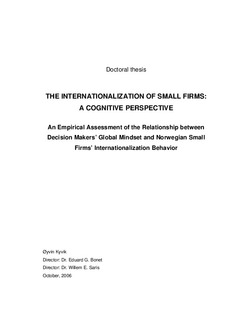| dc.contributor.author | Kyvik, Øyvin | |
| dc.date.accessioned | 2013-10-17T12:55:55Z | |
| dc.date.accessioned | 2019-10-17T11:08:33Z | |
| dc.date.available | 2013-10-17T12:55:55Z | |
| dc.date.available | 2019-10-17T11:08:33Z | |
| dc.date.issued | 2006 | |
| dc.identifier.citation | Kyvik, Ø. (2006). The internationalization of small firms: a cognitive perspective: An empirical assessment of the relationship between decision makers' global mindset and Norwegian small firms' internationalization behaviors (Doctoral dissertation). Universitat Ramon Llull, Barcelona. | nb_NO |
| dc.identifier.uri | http://hdl.handle.net/11250/2622755 | |
| dc.description.abstract | Internationalization of firms has been studied from perspectives ranging from resources, entrepreneurship, networking, marketing and strategy to learning. Although the literature does cover small firms (which the EU defines as enterprises with between 10 and 50 employees), most research focuses on larger firms’ internationalization. Moreover, the latter kinds of studies tend to adopt a behavioral and descriptive approach, traditionally focusing on outbound internationalization activities that usually begin with exports. The existing literature largely assumes that firms have a natural propensity to internationalization. This research adopts a cognitive perspective on management in order to explore the formation of the global mindset and the relationship between the global mindset of small firm decision makers and firm internationalization behavior. A conceptual model and measurement instrument are developed that are based upon a review of the managerial cognition- and the firm internationalization literature. Using structural equation modeling, the theoretical conceptual model is estimated based on empirical data for Norwegian small firms. The model is then developed and partially confirmed. The results indicate that the factors most strongly influencing the formation of a global mindset are the decision-maker’s international work exposure and experience; market dynamism and turbulence; the degree of market internationalization; and the decision-maker’s personal characteristics (e.g. cross disciplinary collaboration, reflection and flexibility). The model indicates a clear causal relationship between the global mindset and firms’ internationalization behavior. One implication of the research is that firms may most easily influence the formation of the global mindset by ensuring that CEOs and employees gain access and exposure to international work experience. A second implication is the finding of a positive relationship between a dynamic and internationalized business environment and the formation of a CEO global mindset. A third implication of the research is that for resource-scarce small firms, domestic performance satisfaction does not positively influence the formation of a decision-maker’s global mindset. | nb_NO |
| dc.language.iso | eng | nb_NO |
| dc.subject | small firms | nb_NO |
| dc.subject | managerial cognition | nb_NO |
| dc.subject | global mindset | nb_NO |
| dc.subject | internationalization | nb_NO |
| dc.title | The internationalization of small firms: a cognitive perspective: An empirical assessment of the relationship between decision makers' global mindset and Norwegian small firms' internationalization behaviors | nb_NO |
| dc.type | Doctoral thesis | nb_NO |
| dc.date.updated | 2013-10-17T12:55:55Z | |
| dc.rights.holder | © 2006 The Author. | nb_NO |
| dc.subject.nsi | VDP::Samfunnsvitenskap: 200::Økonomi: 210 | nb_NO |
| dc.identifier.cristin | 1058504 | |
